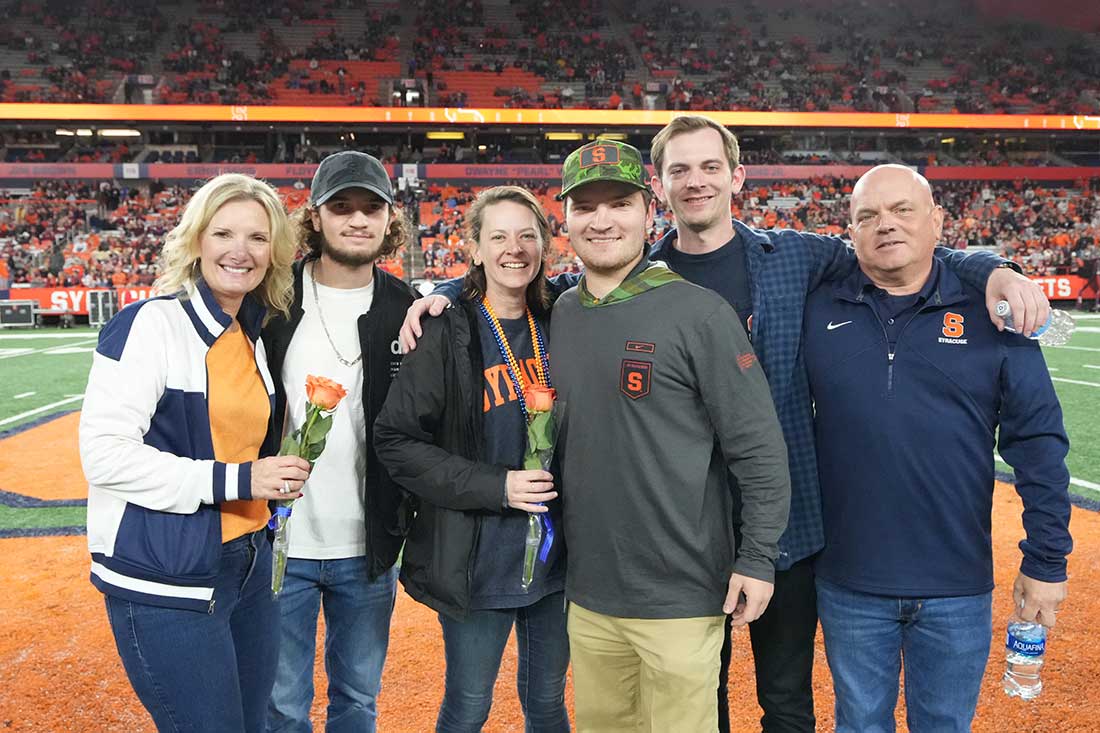
Montgomery, a former NFL star running back and Super Bowl-winning assistant coach, was at Duke University watching his son participate in a football camp. Montgomery says when he looked across the field, he couldn’t help but notice Sobczak, who was born with cerebral palsy and had difficulty walking.
Sobczak, a high school sophomore who had dreams of coaching in the NFL, was talking to a Duke coach who told Sobczak that if really wanted to coach football, he needed to talk to that man over there. He was pointing at Montgomery.
“I saw the struggle he was going through just to walk,” Montgomery says. “But he walked all the way around to the other side of the field to ask me if he could visit me sometime and talk about football. What drew me to David right away was watching this young man being a competitor with what he was dealing with.”
Montgomery, who has become Sobczak’s most trusted mentor, learned that day what many other football coaches and players have learned over the last several years: Never underestimate David Sobczak.
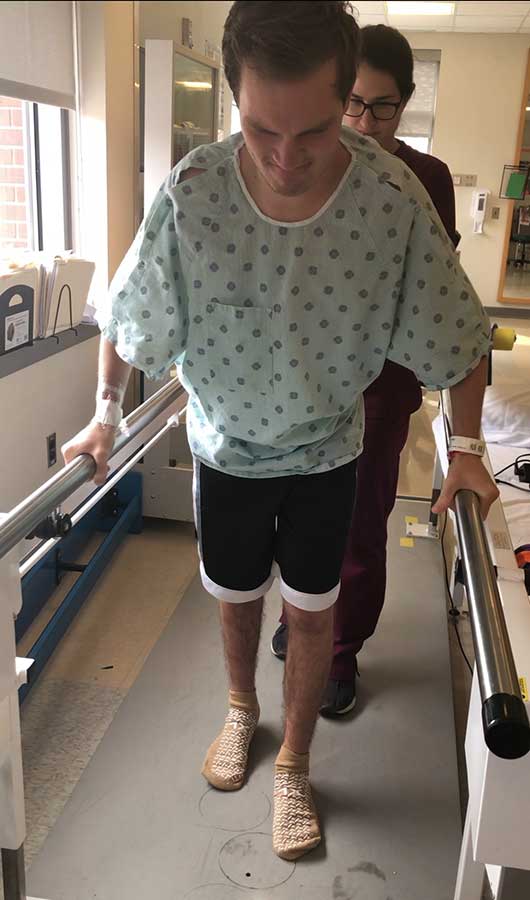
Now a Syracuse University senior, Sobczak is walking without braces following multiple surgeries, and he’s finishing his fourth and final season as an offensive student assistant coach at Syracuse under head coach Dino Babers. On Dec. 29, the Orange will make their first bowl appearance since 2018 against the University of Minnesota in the Bad Boy Mowers Pinstripe Bowl at Yankee Stadium in New York City.
Sobczak is on track to graduate this spring with a degree in social work from the Falk College of Sport and Human Dynamics. He gravitated toward social work and helping others because of the time he spent in hospitals with other children and families who didn’t always have the resources to get the help they needed.
Once he’s established as an NFL coach, Sobczak says he’d like to create a foundation to help families with their children’s hospital bills and serve as a role model for those with disabilities who have dreams of their own.
“The biggest thing I always remind myself is that I have an opportunity to do something bigger than myself,” says Sobczak, a Maryland native who was born in Kingsville and now lives in Owings Mills. “I’m not saying by any chance that I’m going to save the world; I’m not. But there might be a kid down the road who looks at me and says, ‘Hey, if he can do it, I might be able to do something, too.’”
‘See His Personality’
Cerebral palsy is a congenital disorder that affects movement, muscle tone, and posture. It’s caused by damage that occurs to the developing brain, often before birth, and isn’t always noticeable in the first year or so of a child’s life.
When Sobczak was about 15 months old, he wasn’t walking yet and had trouble sitting up. His parents, Dee Anna and David Sobczak, enrolled their son in an infant tumbling program, but the teacher who been running the program for 20 years said she observed that David’s movements were different than the other children.
His parents eventually took David to a neurologist, who ran several tests and determined that he had cerebral palsy. But it wasn’t degenerative, meaning that through braces, surgeries and physical therapy, David would still be able to walk.
Naturally, Sobczak was frustrated by the braces that went right below his knees, the bigger shoes he had to wear for support, and the constant trips and stumbles. Mean kids on the playground threw sand in his braces, and he was once pushed off a swing and had to get stitches in his head “just because I walked weird.”
But two things happened during his childhood that would change the course of Sobczak’s life. He fell in love with football, and he developed a dynamic personality and a gift to talk with anyone at any time about anything, especially football.
“David’s baby brother came along when David was 2, and whenever they met people before Danny could talk, David started to do this thing with his personality to get people to engage with him talking and laughing,” Dee Anna Sobczak says. “He was able to get people to see his personality before they saw he was walking differently. He developed that skill at a very young age, and to this day he has that ability.”
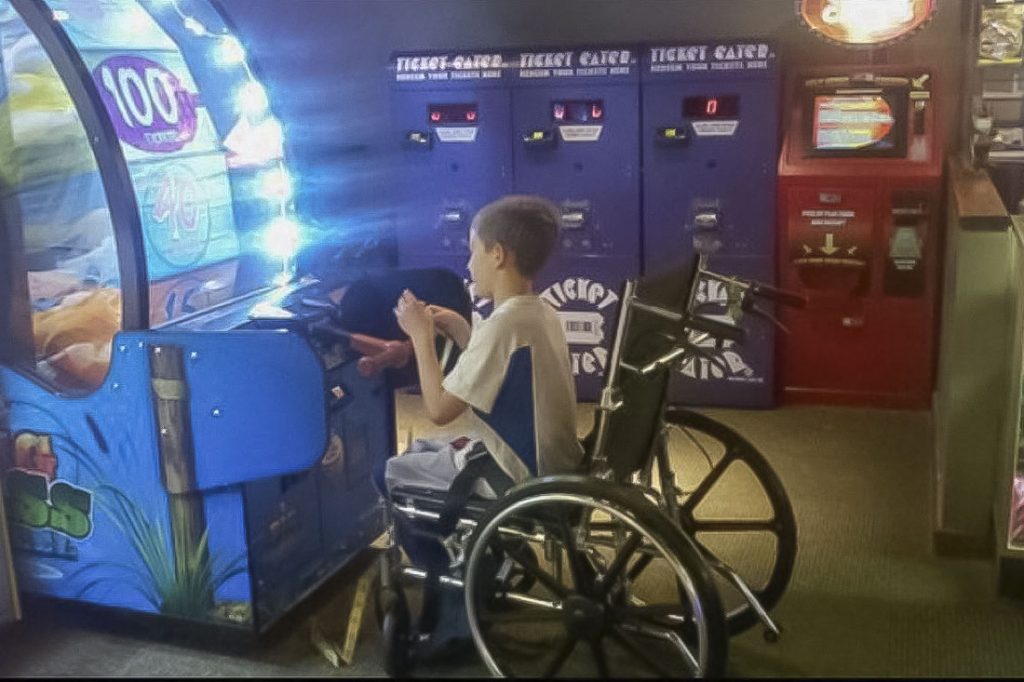
‘What Can I Do?’
Sobczak’s first memories of football are watching games with his father, David, and maternal grandfather, Richard “Pop” Lutz, and going outside to throw the football with them at halftime. Only later, after Lutz had died while Sobczak was in middle school, did Sobczak discover that Lutz was a Syracuse University football fan.
Sobczak played flag football in elementary school but had to stop when boys his age started playing tackle football. By the time he reached middle school, he already had two surgeries: One at 9 to cut and lengthen the spastic muscles in his legs so they would grow with his bones; and one at 11 to create arches on the bottom of his feet with cadaver bones.
Through fifth grade, Sobczak attended a Montessori school, which emphasizes a child’s natural interests rather than formal teaching methods. His move to middle school and test-taking was a disaster at first, but in a sign of what was to come, he adjusted and received the most-improved student award in sixth grade.
Still, it was a difficult transition as his physical limitations became more of issue. While his classmates were playing dodge ball in gym class, he was lifting weights. While his classmates were running around at recess, he was meeting with a physical therapist because he repeatedly dislocated his knees.
“You’re like, man, I can’t do the things that other kids do,” Sobczak says. “I had to navigate my world a little faster than others. Meaning, I had to find out early, what can I do?”
And it was during sixth grade that his beloved Baltimore Ravens won the Super Bowl and Sobczak chose a life in football. At first, he wanted to be a commentator. But then, thinking like a true coach, he figured if he wanted to be a great commentator, he’d have to master the sport first, so he should become a coach.
From that point on, Sobczak couldn’t get enough of football. He studied games, read books, and watched the NFL Network 24/7. His parents had trouble getting him to read until he started reading football books, and then they couldn’t get him to stop.
“I had seen him miss out on other enjoyments like riding bikes and running, things he would never be able to do,” says his father, David Sobczak. “To see him get so much joy out of something like learning about football and football coaching, you couldn’t ask for anything more as it became the No. 1 thing that he looked forward to.”
‘Teacher First, Coach Second’
Sobczak’s first coaching “break” came at St. Paul’s high school in Baltimore County, Maryland. Head coach Paul Bernstorf named Sobczak as a student coach assigned to work with the quarterbacks, scout upcoming opponents, and help design game plans.
“I’d stay up late, read as much as I could, watch DVDs (of previous games), and diagram plays,” Sobczak says. “I found football, I found coaching, and it was the first time in my life where I was like, oh, my God, this is something I can do and something that I love.”
In addition to the coaching experience, St. Paul’s provided Sobczak with the opportunity to network with other college and NFL coaches and Sobczak’s contact list ballooned. There are several examples of his networking, but here’s one of Sobczak’s favorites:
The father of one of St. Paul’s quarterbacks at the time is Marty Mornhinweg, a longtime NFL coach who was then the offensive coordinator for the Ravens. After meeting Sobczak, Mornhinweg asked if he wanted to sit in on a meeting of team’s quarterbacks during offseason practice in the spring. So there’s Sobczak, a high school senior, talking Xs and Os with the likes of Super Bowl-winning quarterback Joe Flacco, rookie and future star Lamar Jackson, and Heisman Trophy winner Robert Griffin III.
Not only that, but later at practice Mornhinweg, with the blessing of head coach John Harbaugh, called Sobczak to the sideline, handed him a clipboard, and asked him to call out the plays for Flacco and the offense. That was a daunting moment, even for someone as gregarious as Sobczak.
“If I didn’t have that moment, I would have never would have felt that OK, maybe I can do this,” he says. “There’s one thing of wanting to, and there’s another thing of getting out of your shell and getting comfortable being uncomfortable.”
Sobczak attended about 15 Glazier coaching clinics throughout the country when he was in high school to meet coaches and pick their brains. “He’d be the only kid attending and he grew really comfortable introducing himself to people, talking, and sharing contact information,” Dee Anna Sobczak says.
That’s how he met Montgomery, who played in a Super Bowl with the Philadelphia Eagles and won Super Bowl championships as a coach with the St. Louis Rams and Ravens. When they met at Duke, they realized they lived only 30 minutes apart in Maryland.
“I thought he’d call me, we’d talk a little bit of football for 15 minutes, and that would be it,” Montgomery says, laughing. “But now it’s been six, seven years and we’re still talking.”
Many times, one of Sobczak’s parents would drop him off at Montgomery’s house and they would spend hours talking about the intricacies of football. Since Sobczak has been at Syracuse, Montgomery has emailed him after every Syracuse game to share his thoughts on what happened in the game.
“Coaches, they’re a dime a dozen. But I saw that this guy here wants to be more than a coach, he wanted to be a teacher,” Montgomery says. “A lot of people can coach, but to be a teacher it takes a different kind of guy who wants to do that. That’s how I view David, as a teacher first and a coach second.”
‘Made Me a Better Coach’
To be a successful teacher, you must be able to communicate with your students, show empathy for their individual situations, and build trust. Those are also the building blocks of social work, and that’s why Annette Hodgens–then the assistant director of undergraduate admissions at Falk College–recommended that Sobczak enroll in the School of Social Work.
Social Work Assistant Professor Ryan Heath, Sobczak’s advisor, first met Sobczak at the freshmen orientation meeting. Normally, Heath says, department advisors and their students don’t have serious conversations until the student’s sophomore year. But like with Montgomery years before, Sobczak made it a point to march across the room and introduce himself to Heath.
“David came right up to me after the meeting and introduced himself, which to me signaled one of David’s great strengths, that he is very attuned to, and interested in, pursuing and maintaining relationships,” Heath says.
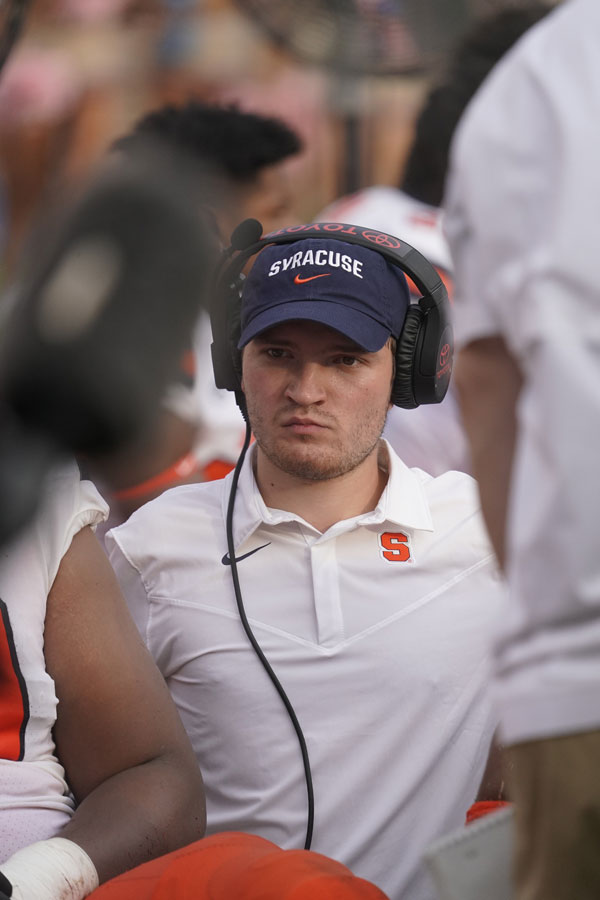
As their relationship developed, Heath says they learned from each other as Heath discovered how social work principles apply to coaching. Sobczak says he appreciates that Heath never tried to talk him out of coaching as his profession.
“It’s made me a better coach because you learn every individual is different, whether it’s in their learning style or the way they interact, and it’s taught me how to reach people who don’t come from the same background,” Sobczak says. “I think that’s a very important tool as a coach, because if you only reach a certain group of guys, it’s going to be hard.”
‘You Wait, Just Watch’
Before he went off to college to pursue his dream, Sobczak had one more surgery in March of his senior year of high school, when he had what he calls his “hockey puck” surgically inserted into one side of the abdomen near his hip bone. Technically called a baclofen pump, the device delivers baclofen, a medicine, directly into the spinal canal to reduce the spasticity of Sobczak’s leg muscles.
Before his surgery, Sobczak had considered several schools and Syracuse was on his list because his high school coach was close with then-Syracuse tight ends/receivers coach Reno Ferri and they had arranged a visit to campus. Sobczak met the coaching staff on his visit and was encouraged that he would get an opportunity to coach.
“When I got my baclofen pump put in my senior year, (Syracuse Director of Player Personnel) coach (Roy) Wittke reached out on behalf of the coaching staff to my mom and asked how I was doing,” Sobczak says. “I was a student coach (in high school) and I’d been on campus, but I never coached a day in my life at Syracuse. When they reached out like that, I said this is where I’m supposed to be.”
It has been quite a ride for Sobczak, who has filled a variety of roles from working with the tight ends, running backs and special teams to scouting to designing plays on a computer for the offensive line to study. He has made friends for life with the players and coaches, and he’s grateful that none of them “looked at me like I have a disability.”
“I learned a lot, I failed a lot, and even with my disability, these guys have been more than supportive, and they’ve treated me just like they do with the other players and the other coaches,” Sobczak says. “Coach Babers has been awesome toward me. Like any good coach, he’s been good to you, hard on you, and he’s given you opportunity and responsibility.”
Following the bowl game, Sobczak will turn his attention to a professional career in the NFL. Montgomery, who has seen Sobczak’s determination first-hand for several years, says he has no doubt Sobczak will be hired by the NFL because when a team interviews him “they’re not going to just be impressed, they’re going to be shocked by his understanding of the game.”
And if all goes as planned, Sobczak will eventually find a way to help those in need who may not have the support system in place that enabled him to realize his dream.
“He has resilience, and he has learned how to take his adversity and turn it into his champion,” Dee Anna Sobczak says. “And he’s not given up. When people say you can’t, he says, ‘you wait, just watch.’”
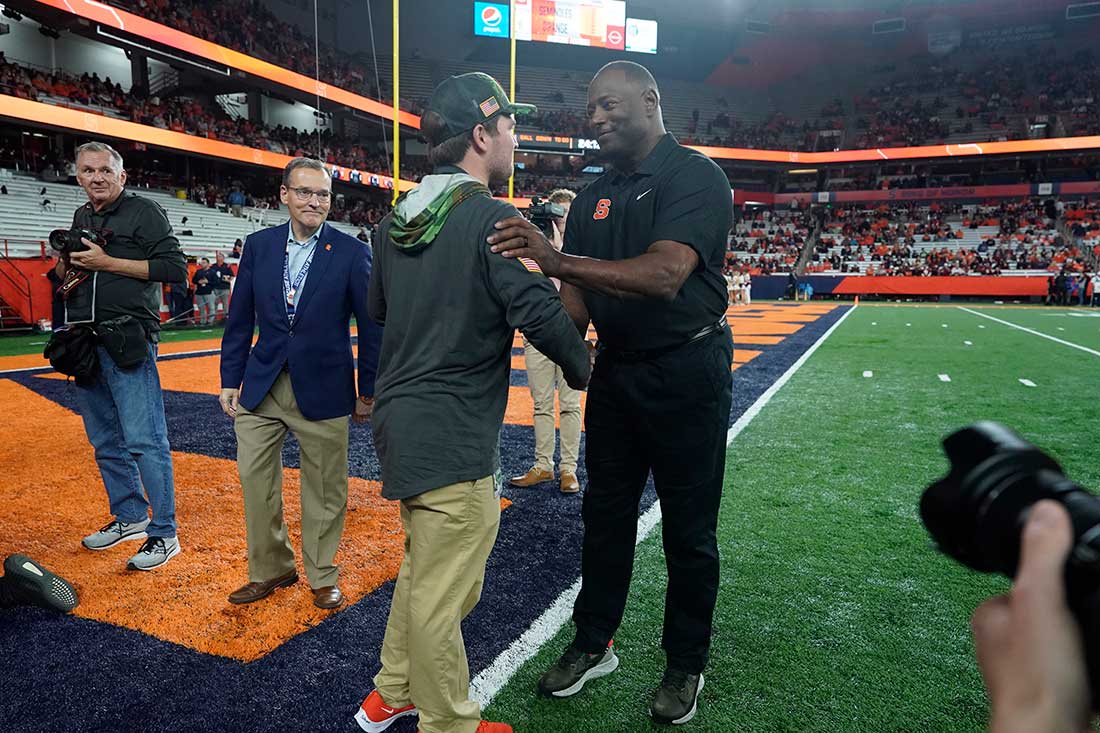
An Open Letter From David Sobczak to Coach Babers and the Syracuse Football Team
“Thank you, everyone, for taking me in. Thank you for giving me my first opportunity. Syracuse has been the best four years of my life. I never thought the best friends in my life would grow up in different places than I did. You gave me friendships and relationships for life. I look at schools all across the country and I can’t imagine myself anywhere else. Through every win, every loss, that’s the way it feels. I love this place and I love this football team. This football team is the reason I came here, and this football team is the reason why I’m going to leave here a better person and better coach than when I came.”
